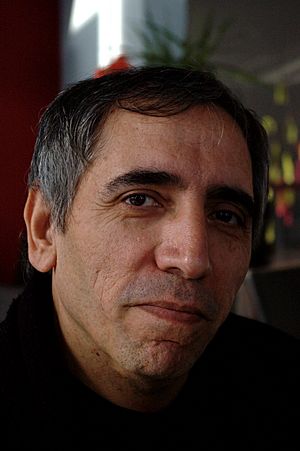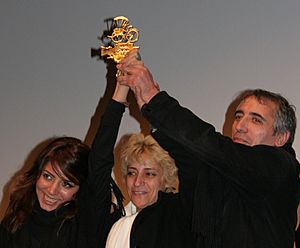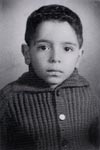Mohsen Makhmalbaf facts for kids
Quick facts for kids
Mohsen Makhmalbāf
|
|
|---|---|
| محسن مخملباف | |
 |
|
| Born | May 29, 1957 Tehran, Imperial State of Iran
|
| Nationality | Iranian |
| Years active | 1981–present |
| Political party | Mojahedin of the Islamic Revolution Organization (1979–1980s) |
| Spouse(s) | |
| Children | Samira Meysam Hana |
| Awards | Freedom to Create Prize Federico Fellini Honour |
Mohsen Makhmalbaf (Persian: محسن مخملباف) was born on May 29, 1957. He is a famous Iranian film director, writer, and producer. He has created over 20 feature films and won more than 50 awards. He has also been a judge at many important film festivals.
Some of his well-known films include A Moment of Innocence (1996) and Kandahar. His recent documentary is The Gardener. His latest feature film is The President.
Makhmalbaf's films have been shown at film festivals around the world. He is part of the "new wave" movement in Iranian cinema. Time magazine chose his 2001 film Kandahar as one of the top 100 films ever made. In 2006, he was a judge at the Venice Film Festival.
Makhmalbaf left Iran in 2005. He has lived in Paris since 2009.
Contents
His Life Story
Mohsen Makhmalbaf was born in Tehran, Iran, on May 29, 1957. When he was 15, he joined a group that was against the ruler of Iran at the time. He was later imprisoned for five years. He was released after the Iranian Revolution in 1979. He moved out of Iran in 2005.
His Film Career
Makhmalbaf is a very important person in Iranian cinema. His movies often explore how individuals relate to their society and political world. His work shows how Iran and its people have changed over time. Makhmalbaf has made films in many different styles. These include realistic films, fantasy, and stories about everyday life. He often focuses on themes of childhood and cinema.
Early Films
In 1981, he wrote the script for a film called Towjeeh. In 1982, he wrote another script for Marg Deegari. His first film as a director was Tobeh Nosuh in 1983. In 1985, he directed Boycott. This film is believed to be based on his own experiences. It tells the story of a young man who is sentenced to death.
In 1987, Makhmalbaf directed The Cyclist. This movie shows human struggles and strength. It is about Nasim, an Afghan refugee in Iran. Nasim needs money for his sick wife. He agrees to ride a bicycle in a small circle for a week to earn money for her medical care.
Working with Abbas Kiarostami
In 1989, another Iranian director, Abbas Kiarostami, heard a strange story. A man in Tehran pretended to be Makhmalbaf. Kiarostami made a film about this event in 1990 called Close-Up. Makhmalbaf himself appeared in the final scene of the film. Close Up is now considered a masterpiece in world cinema. Critics voted it one of the top 50 greatest films of all time in 2012.
Later Works
Time of Love (1991) was Makhmalbaf's ninth feature film. It is a romantic story that shows three different versions of the same events.

In 1996, Makhmalbaf directed Gabbeh. This film follows the nomadic Ghashghai people. Their colorful carpets tell stories. The movie's main story is about a young woman who loves a stranger but cannot marry him. The film is romantic and dream-like.
In 1996, Makhmalbaf started the Makhmalbaf Film House. This was a school for young filmmakers. It soon became a production company for his family members who were also becoming filmmakers. In 1997, his 17-year-old daughter, Samira, directed The Apple. Mohsen helped her by writing the script and editing. His wife, Marzieh Meshkini, also became a director.
Kandahar (2001) is a fictional story inspired by real events in Afghanistan. It is about an Afghan woman who grew up in the West. She returns to Afghanistan to stop her sister from taking her own life. This happens during a time when women's rights were severely limited.
Political Views
In December 2023, Makhmalbaf joined 50 other filmmakers. They signed an open letter asking for a ceasefire in the conflict in Gaza. They also asked for help to reach people in Gaza and for hostages to be released.
Awards and Honors
- Selected as the best filmmaker after the revolution by cinema readers, 1988.
- A Moment of Innocence: Named among the Top Ten Films of the Decade by film festival directors and critics, 1999.
- Received the "Federico Fellini Honor" from UNESCO in Paris, France, 2001.
- Won the "Freedom to Create Prize" for his work promoting human rights and social justice through art, England, 2009.
- Received an Honorary Degree in Cinema from Nanterre University, France, 2010.
- Received an Honorary Degree in Literature from St Andrews University, Scotland, 2011.
Jury Roles
- He was a jury member at the 2024 Busan International Film Festival. He judged films in the 'BIFF Mecenat Award' competition.
Filmography
| Year | English title | Original title | Length | Notes |
|---|---|---|---|---|
| 1983 | Pure Repentance | Tawba Nasuh | 100 minutes | |
| 1984 | Two Blind Eyes | Do Cheshme Bisoo | 102 minutes | |
| Seeking Refuge | Isti'azah | 89 minutes | ||
| 1986 | Boycott | Boycott | 95 minutes | |
| 1987 | The Peddler | Dastforoush | 90 minutes | |
| 1989 | The Cyclist | Bicycleran | 83 minutes | |
| Marriage of the Blessed | Arousi-ye Khouban | 70 minutes | ||
| 1990 | The Nights of Zayande-rood | Shabhaye Zayandeh-rood | 100 minutes/63 minutes (censored) | |
| 1991 | Time of Love | Nobat e Asheghi | 70 minutes | |
| 1992 | Once Upon a Time, Cinema | Nasseroddin Shah Actor-e Cinema | 92 minutes | |
| 1993 | Images from the Qajar Period | Tasvir Dar Doran-e Ghajar | 18 minutes | Short documentary |
| The Artist | Honarpisheh | 86 minutes | ||
| Stone and Glass | Sang-o-Shisheh | 20 minutes | Short documentary | |
| 1995 | Hello Cinema | Salaam Cinema | 81 minutes | Docudrama |
| 1996 | A Moment of Innocence | Nun va Goldoon | 78 minutes | |
| Gabbeh | 72 minutes | |||
| 1997 | The School the Wind Blew Away | Madrese-i ke bad bord | 8 minutes | Short |
| 1998 | The Silence | Sokout | 74 minutes | |
| 1999 | Tales of Kish | Ghessé hayé kish | 72 minutes | Segment The Door |
| 2000 | Tales of an Island | Dastanhaye Jazireh | 76 minutes | Segment Testing Democracy |
| 2001 | Kandahar | Safar-e Ghandehar | 85 minutes | |
| The Afghan Alphabet | Alefbay-e afghan | 46 minutes | Documentary | |
| 2005 | ... & Philosophy | Sex o phalsapheh | 102 minutes | |
| 2006 | Scream of the Ants | Faryad moorcheha | 85 minutes | |
| The Chair | Sandali | 8 minutes | Short | |
| 2009 | The Man Who Came with the Snow | 75 minutes | Co-directed with Marzieh Meshkini | |
| 2012 | The Gardener | Bagheban | 87 minutes | Documentary |
| 2013 | The Endless Smile | Labkhande-bi-payan | 52 minutes | Documentary |
| 2014 | The President | 118 minutes | ||
| 2015 | The Tenant | 18 minutes | Short | |
| 2019 | Marghe and Her Mother | 101 minutes | Set in Italy |
Film Appearances
- Marriage of the Blessed (1989), directed by himself
- Close-Up (1990), directed by Abbas Kiarostami
- Hello Cinema (1995), directed by himself
- A Moment of Innocence (1996), directed by himself
- Tales of an Island (2000), directed by himself and Dariush Mehrjui
See also
 In Spanish: Mohsen Makhmalbaf para niños
In Spanish: Mohsen Makhmalbaf para niños
- Cinema of Iran
 | William M. Jackson |
 | Juan E. Gilbert |
 | Neil deGrasse Tyson |


